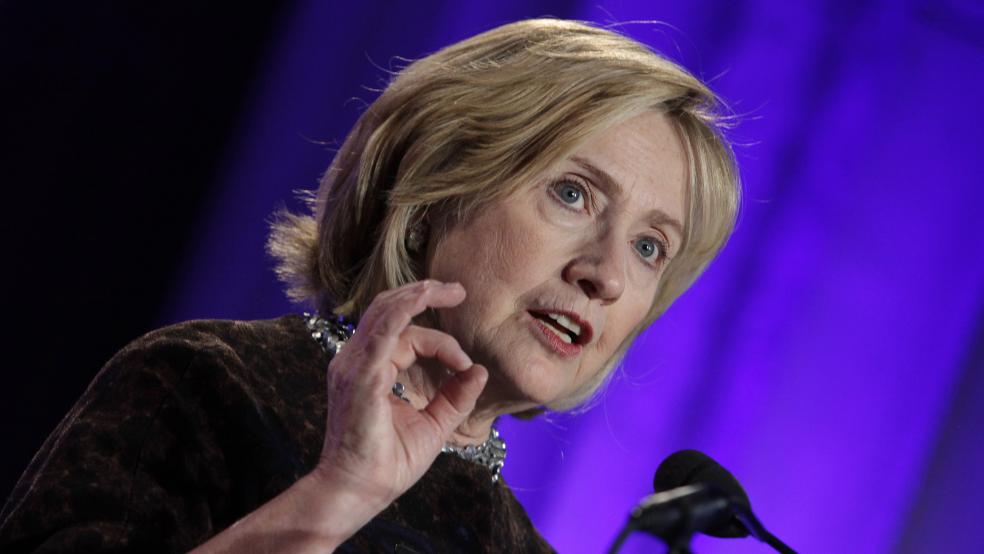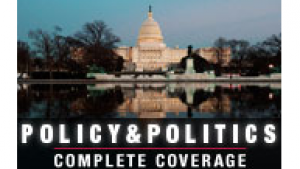For now, at least, Hillary Clinton is in the political catbird seat. No longer under fire by the GOP for her role as Secretary of State, the former first lady is traveling the country, picking up speaking fees and stoking interest in a possible second bid for the Oval Office in 2016.
While her former one-time rival, President Obama, weathers blistering criticism of the dysfunctional Obamacare sign-up system, Clinton gets to bask in the adulation of supporters eager to see another Clinton as president.
Right now, she’s the prohibitive favorite to win the Democratic nomination in 2016 if she chooses to run. About 65 percent of Democrats and independents said in a recent CNN poll they would most likely back her for their party’s nomination, while only 10 percent would favor Vice President Joe Biden.
RELATED: HILLARY CLINTON’S HYPE MACHINE GEARS UP FOR 2016
At the same time, Republicans are reeling from voter backlash about the 16-day government shutdown. And the divided party may be months away from coalescing around a frontrunner such as N.J. Gov. Chris Christie or Sens. Ted Cruz of Texas, Rand Paul of Kentucky and Marco Rubio of Florida.
While Clinton’s presidential prospects seem bright, GOP strategists believe she may have trouble answering for the Benghazi, Libya debacle in September 2012 that left four Americans dead.
RELATED: IF BENGHAZI WAS A COVER-UP, HOW HIGH DID IT GO?
“There’s no question there is a sense of inevitability to the point where I don’t think she will get a serious challenge,” Whit Ayres, a prominent Republican consultant who is working for Rubio, said Thursday. “On the other hand, there was also a sense of inevitability to her candidacy in 2008, and we saw how that turned out.”
ADVANTAGE HILLARY?
Since leaving the State Dept. last February, Clinton has picked up honors for her three decades of public service and collected speaking fees as high as $200,000 per appearance.
Supporters say the accolades are well deserved. But Clinton seemingly has figured out how to leverage the awards to her political advantage, just as the groups honoring her benefit from having the would-be candidate promote their causes, as The Washington Post has reported.
Clinton was in Washington Thursday evening, addressing a tenth anniversary event for the Center for American Progress, the left-leaning and influential think tank and activist group founded by John Podesta, a White House chief of staff for Bill Clinton.
Mrs. Clinton didn’t say whether she’d run or not, but she did sharply criticize Republican congressional leaders for putting the country through the government shutdown and near-default on U.S. debt. She contrasted what she described as CAP’s meticulous fact-based analysis and political activity with that of the ideologically bent Tea Party Republicans.
“We’ve seen unfortunately what happens in our public debate … where people make claims and arguments that have no basis in evidence but which are ideologically motivated – when politicians choose scorched earth over common ground,” Clinton told the well-heeled crowd. “Families have felt the consequences: workers furloughed, businesses suffering, children thrown out of Head Start programs. Poor mothers worrying they won’t get the help they need” to feed their babies, she said.
“We are careening from crisis to crisis instead of having a plan . . . focusing on common-sense solutions, and being relentless in driving towards them,” she said.
DEEP DEMOCRATIC ROOTS
Clinton couldn’t have been more at home at the reception. Neera Tanden, a long-time adviser to Clinton who was involved in her 2000 New York Senate race and 2008 presidential campaign, is president of CAP. The think tank has helped generate debate on issues important to Bill and Hillary Clinton, including health care reform, ending the war in Iraq, income inequality and growing the middle class. Bill Clinton has described CAP as “the intellectual engine for progressive politics.”
RELATED: JUST ONE REPUBLICAN BARELY BEATS CLINTON IN GEORGIA
Hillary Clinton spearheaded her husband’s drive for national health care reform in the early 1990s, a high-profile venture that was soundly rejected on Capitol Hill. Health care reform subsequently became unpopular for Democrats until Podesta and other CAP officials began talking it up in 2004. By the time of the 2008 Democratic primary battles, health care reform was the topic de jour of many candidates on the left. Clinton and Obama repeatedly sparred over competing plans that were remarkably similar.
Both plans were designed to build on the existing system of employer-sponsored health care, requiring companies to either offer insurance or contribute to the cost of covering employees. Insurers would be required to cover everyone, regardless of health. The major difference was that Clinton’s plan required people to have health insurance – the so-called individual mandate – while Obama’s plan only required children to be enrolled.
Obama later embraced the individual mandate in pushing through the 2010 Affordable Care Act.
Since leaving the administration, Clinton has defended the new health care law from Republican critics who have attempted to defund or derail it. But she had nothing of substance to say on Thursday night about the embattled health care law – and its flawed website.
In assessing her strengths as the likely Democratic candidate in 2016, Ayres, the GOP strategist, said, “She has vast experience at the highest levels of government and is married to the best political consultant in America.”
But her strength is also a source of weakness: At 65 years old, she could also seem like “yesterday’s news and a throwback to the past,” Ayres said.
Her weaknesses go to her stewardship over Obama’s foreign policy, Ayres said, most notably a “lead-from-behind policy” in Syria and the State Dept.’s failure to protect an American diplomatic mission in Benghazi from attack last year.
RELATED: BIDEN VS. CLINTON—WOULD JOE STAND A CHANCE?
A prominent Democratic pollster dismissed the GOP attacks on Clinton as “largely noise” and predicted they would have little impact on her candidacy if she decides to run. The pollster, who asked not to be named, said that in some ways, “Hillary is in much better position now than she was in 2008” because she was operating back then in the shadow of her famous husband – but now she can run on her own record as former Secretary of State and a world leader. “Now she’s her own person,” the pollster said.
Larry Sabato, the University of Virginia political scientist, agreed to some extent with Ayres that “the greatest danger to her election in 2016 is the past.” There’s an assumption, he said, “that Hillary won’t be dogged by the ghost of Bill, her own ‘90s persona, and dynasty questions,” Sabato said.
“Not necessarily so. Sooner or later, the same old memories will be dredged up and recycled, and the concerns about Bill and his potential roles and activities as First Gentleman will be back on the table. This time, unlike in 2008, Hillary needs some good answers.”






